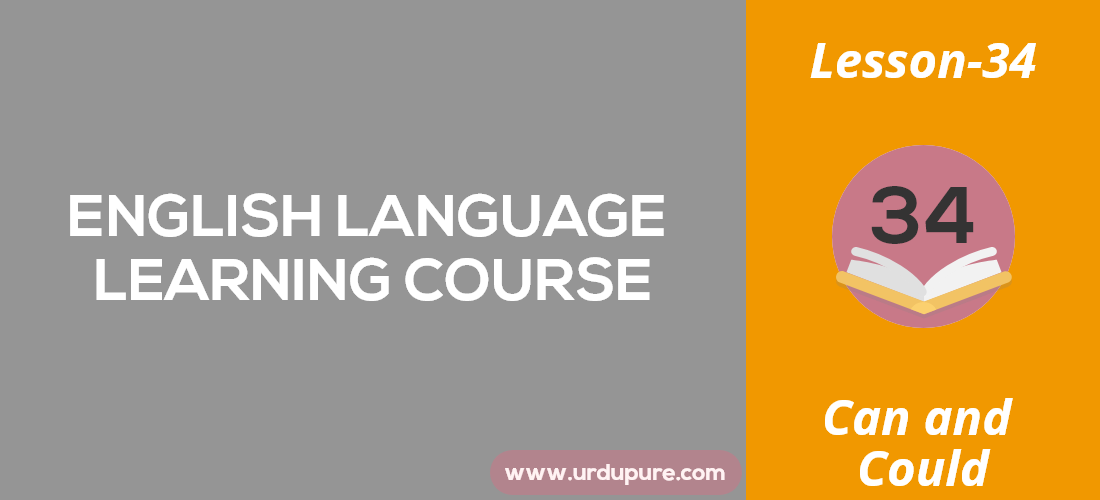Can and Could

Can and Could
Modal verbs play an important role in English grammar. One can think of them as a backbone of grammar. We often use modal verbs in our daily conversations (speaking or writing.) Modal verbs are also known as auxiliary verbs or helping verbs.
In this lesson, we are going to learn the uses and limitation of modal verbs ‘can’ and ‘could’. Can is almost similar to ‘may’ but can is likely to use commonly.
Can
Can is a modal verb that is used to:
- Talk about ability or possibility.
- Ask for or give permissions.
Structure of can is quite simple.
Subject + can+ main verb |
Uses of Can
There are three main uses of ‘can’. However, there are some other uses of can too which we will see after the main uses.
Ability
The most frequent use of modal verb ‘can’ is expressing the ability to do something.
Example:
- I can fix my car.
- You can walk.
- She can climb that wall.
- Dogs can bite.
- Fishes can swim.
- Birds can fly.
- Paul can drive a car.
One can express the inability to do something using can’t or cannot.
Example:
- Humans can’t fly.
- I can run 10 miles in 30 minutes.
- My brother can’t speak French.
- Paul cannot drive a car.
- They cannot run faster than me.
You can also use ‘can’ to question someone’s ability.
Example:
- can you swim?
- Can you drive a car?
- Can you run faster than him?
As you can see from all of the above-given examples that ‘can’ is used for the present tense. But, you can use when you make present decisions about future ability.
- Can you help me choose the prom dress?
- Umm, I am busy today, but I can help you tomorrow with it.
Possibility in general
The second use of modal verb ‘can’ is to express the general statements about the possibility. You cannot use ‘can’ to talk about future possibilities. In that case, you have to use ‘may or might’.
Example:
- I know, he can win basketball championship this year.
- I think your refrigerator can be repaired, but it will cost a lot.
- It can get colder at night, so take this jacket with you.
Permission
The third essential use of ‘can’ is that it used to ask for or give permission. But using ‘can’ to ask for permission is informal.
Example: To ask for permission to do something.
- Can I use your pen?
- Can we leave the office now?
- Can I ask you one more favor?
- Can I sit on that couch?
- Can we play badminton now? We have completed our homework.
- Can I go to the cinema tonight?
Example: To permit to do something.
- You can sit on my couch.
- You can use my pen.
- You can leave the office now.
- Paul, you can play in the garden if you like.
We use can’t or cannot to deny the permission.
Example:
- You cannot sit on my seat.
- You can’t go to the cinema tonight.
- You cannot leave the office now. The working hours are not over yet.
To offer to do something.
Besides the three main uses of 'can', you can use 'can 'when you offer to do something for others.
Example:
- I can carry your bag.
- Can I help you?
- I can drop you home.
- I can help you with your assignments.
Uses of can’t
Can't is the negative form of can. It is used for something not allowed or forbidden, and when you are sure that something isn't real or something surprising. We use 'cant' to express that something is prohibited by law.
Note: Can't and Cannot are interchangeable.
Example: something forbidden
- You can't park your bicycle here. This parking is for cars.
- You can't smoke inside the restaurant.
- You can't drive the car; you are under 18 now. (law)
Example: something surprising.
- He can't pass the exam; he scored 0 in the mid-terms.
- This can't be my car; my car is blue.
Could
Could is the past tense of 'can' but apart from that, it has some other uses too. Could is a modal verb that is used to:
- Talk about ability in the past.
- Politeness to ask for permission.
- Give a suggestion when asked.
We will only discuss these primary uses of could in the lesson.
Structure of 'could' is quite simple and similar to 'can'.
| Subject + could+ main verb |
Uses of Could.
Ability in the past.
We can use ‘could’ to express the ability of someone to do something in the past.
Example:
- When I was eight years old, I could climb the tree within a minute.
- Paul could juggle ten balls when he was only ten years old.
- She could speak several languages when she was seven years old.
- When I was younger, I could dance very well.
Permission
The other primary use of ‘could’ is to ask for permission politely in the present.
Example:
- Could I please use your marker?
- Could we watch another movie, please?
- Could you pass me the plate?
Suggestion
You can use ‘could’ when you are asked to give suggestions or tell your opinion about something.
Example:
- You could buy a new phone.
- She could make tea instead of coffee.
- We could go swimming if your brother’s interested.
Couldn’t
Like can, we use couldn’t when we are sure that something is untrue or is surprising.
Example:
- It couldn’t be my car. It is black; my car is blue.
- She couldn’t paint that; she is so bad at painting.
Conclusion
In this lesson, we have covered the primary uses of 'can', 'could', 'can't' and 'couldn't'. There are some other uses of couldn't which are not necessary at the beginner level. Just try to remember that could is the past tense of 'can' but not in all the cases.
}



